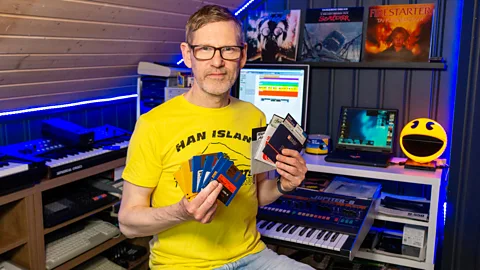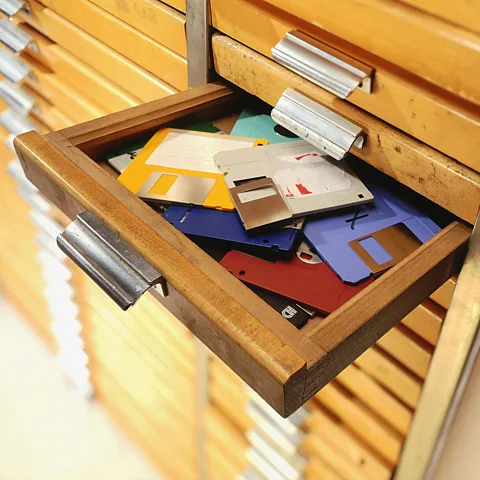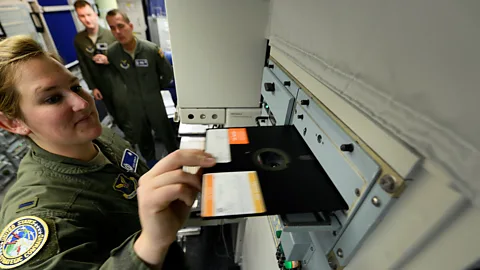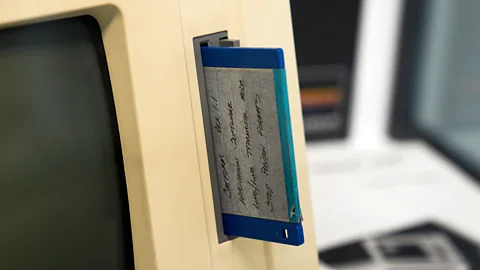Obsolete, but not gone: The people who won't give up floppy disks
 Espen Kraft
Espen KraftThe last floppy disk was made over a decade ago and doesn't even have enough capacity to store a modern smart phone picture, so why do some people still love using them?
When an idea for a new piece of music begins swirling in Espen Kraft's mind, he turns to one of his many boxes of floppy disks. Flipping open the lid, the musician and YouTuber from Norway stares down at rows of colourful plastic squares inside. His fingers browse across them, as fast as lightning.
"Bass sound from Moog" reads one label. Just what Kraft was looking for. He plucks the disk out and slams it into his synthesizer. As the machine embraces it, there are clunky yet reassuring noises. This part, Kraft says, is where the magic happens.
The sample is almost ready to play but not quite – it's the anticipation as it loads that sparks a certain nostalgia, what Kraft calls, "a nice, warm, cosy place". The idea is flowing now. He presses a key. His ears fill with sound.
If you remember a time when using floppy disks didn't seem weird, you're probably at least 30 years old. Floppy disks or diskettes emerged around 1970 and, for a good three decades or so, they were the main way many people stored and backed up their computer data. All the software and programmes they bought came loaded onto clusters of these disks. They are a technology from a different era of computing, but for various reasons floppy disks have an enduring appeal for some which mean they are from dead.
The original 8in (20cm) and 5.25in (13cm) floppy disks were actually floppy – you could bend them slightly without harming the magnetic material inside.
But the later 3.5in (8.75cm) disks were arguably the most successful. It is these that came to be immortalised as the "Save" icon in many computer applications even today. The 3.5in disks, which Espen Kraft uses, are small and rigid, not actually floppy, but that means they are both more robust and easier to store.
With the dawn of the 21st Century, however, for most computer users, floppy disks were on their way out – increasingly supplanted by writeable CDs and thumb drives. And now, cloud storage is ubiquitous. The most widely used type of floppy, with a maximum capacity of less than three megabytes, can hardly compete. Unless you are in love with them – and some people are.
There are also those who depend on them. Various legacy industrial and government systems around the world still use floppy disks. Even some city transport systems run on them. And while these users are slowly dying out, a handful cling on, despite the fact that the last brand new floppy disk manufactured by Sony was back in 2011. No-one makes them anymore, meaning there is a finite number of floppy disks in the world – a scattered resource that is gradually dwindling. One day, they might disappear entirely. But not yet.
 Alamy
Alamy"I've always been very meticulous about storing my floppies in a dry and not-too-humid environment," says Kraft, who is in his early 50s. "Maybe one out of 100 floppies goes bad for me, occasionally."
This is one of the risks facing anyone still using this format. Kraft has spoken to people whose collections have suffered a far more serious rate of corrupted disks – perhaps they were stored in an attic or basement. Not the ideal habitat for ageing floppies.
If your floppy disks become corrupted, it is still possible to replace them so long as you have backed up your data. Tom Persky, a US businessman, has been selling "new", as in, unopened, floppy disks for years and still finds the trade lucrative. He runs Floppydisk.com, which offers disks for about US$1 (£0.80) each, though some higher capacity versions cost up to US$10 (£8) per disk, he says. Persky has customers all over the world and you could split them roughly 50-50 into hobbyists and enthusiasts like Espen Kraft on one side, and industrial users on the other. This latter category encompasses people who use computers at work that require floppy disks to function. They are, essentially, locked in to a format that the rest of the world has largely forgotten.
"I sell thousands of floppy disks to the airline industry, still," says Persky. He declines to elaborate. "Companies are not happy about when I talk about them."
But it is well-known that some Boeing 747s, for example, use floppy disks to load critical software updates into their navigation and avionics computers. While these older aircraft might not be so common in Europe or the US these days, you might find one in the developing world, for instance, Persky hints. There are also pieces of factory equipment, government systems – or even animatronic figures – that still rely on floppy disks.
And in San Francisco, the Muni Metro light railway, which launched in 1980, won't start up each morning unless the staff in charge pick up a floppy disk and slip it into the computer that controls the railway's Automatic Train Control System, or ATCS. "The computer has to be told what it's supposed to do every day," explains a spokesman for the San Francisco Municipal Transport Agency (SFMTA). "Without a hard drive, there is nowhere to install software on a permanent basis."
This computer has to be restarted in such a way repeatedly, he adds – it can't simply be left on, for fear of its memory degrading.
In some sectors, the legacy use of floppy disks is being phased out. In 2022, a Japanese politician "declared war" on the ongoing use of older media. Subsequently, earlier this year, Japan's Ministry of Economy, Trade and Industry announced that the government would no longer require businesses to submit official forms and applications on floppy disk. The US military was still using 8in (20cm) floppy disks for its nuclear weapons control system as recently as 2019. That summer, however, the military switched to a "highly secure solid state digital storage solution" instead.
There are other reasons why some organisations have been reluctant to move away from using floppy disks. While there can be security risks when it comes to relying on old computer systems in the 21st Century, because antiquated and unpatched systems are in principle easier to hack, the physical nature of floppy disks also offers some protection. "If floppy was the only interface, the only way to get malware on to [the computer] would be via said floppy disk," says Ken Munro, a cyber-security expert at Pen Test Partners. "That's quite a limiting factor for the attacker," he says.
Still, the SFMTA is now, after four decades, procuring contracts for an upgrade to its systems, which will see the Muni Metro floppy disks finally retired. The new computers will use wi-fi and cellular connections to beam updates wirelessly around the railway's digital network.
Back in Norway, Kraft is not looking to move away from floppy disks any time soon. And he has been careful to take some precautions with his ageing collection.
Some of the audio samples Kraft has stockpiled in his giant floppy disk collection are irreplaceable. Over many years, he has gathered sounds from countless exotic sources, such as the synthesiser he harvested samples from in London back in 1992. If data like that ever got wiped, he knows he could never find the original source again. So, as well as the thousands of floppy disks he keeps in boxes in his house in Norway, Kraft has backups, too. There are copies of his most treasured audio files in the cloud and, just to be safe: "A large hard drive, which lives in a drawer in my wife's desk in her office – in another town," he says.
But these backups are just insurance policies. It's the floppies themselves that really matter to Kraft. His love of the format is what sets him, and others like him, apart from so-called "legacy users" who just haven’t upgraded yet to some newer technology.
Kraft adores floppy disks because they help him creatively, he says. He doesn't want to make music that merely apes 1980s styles – rather, he wants it to sound like it actually came from that decade.
It's when Kraft is using antiquated equipment that he makes his best music, he says. Feeling the ruggedness of a treasured disk as it slots into a dusty old drive. In his opinion, more modern equipment with gigabytes of storage doesn’t come close. He even performs live shows with floppy disks and has used them during musical appearances on Norwegian television.
To this day, Kraft records new sounds and samples straight onto this physical format, including crickets singing in the forest near his house in the evening. If you pitch that cacophony down by 10 octaves or so, and add some reverberation as well as a little delay, then lo: "You have instant music," says Kraft. "A very nice custom soundstage," he says.
 Getty Images
Getty ImagesThe eclecticism of the recordings on Kraft's floppy disks would not surprise Adrian Demleitner at the University of the Arts Bern in Switzerland. He and colleagues are in the process of amassing an archive of floppy disks featuring video games and video game-related data for a research project into early digital sub-cultures.
Demleitner lurks in online marketplaces and makes contact with people who have old computer systems for sale because, often, those systems come with a box of floppy disks. Typically, he and the seller arrange to meet in public for the handover. "Sometimes you get weird looks [from members of the public]," says Demleitner, recalling a recent exchange in a local café.
But the disks he buys are a treasure trove. He's found old games, as well as save data recording the progress people made in various games they played decades ago. Then there's all the other, non-game-related stuff: electronic music, spreadsheets – even a list of every movie somebody had in their home collection.
"My absolute dream would be to find unpublished video games that somebody tinkered with at home," says Demleitner. He says building the archive is a "tremendous responsibility". But it's enjoyable, too. He loves using floppy disks himself, manually searching through stacks of them in a whirl of discovery, then loading whatever he's found onto some archaic piece of hardware.
In England, IT manager Karl Dyson also has a fascination with video games that come on floppy disks. Specifically, those for the Amiga 500, an early home computer from the late 1980s.
Dyson runs Retro32.com, a website and shop for like-minded fans of similar media. He sells a wide range of retro gaming kit – even newly printed floppy disk labels. In his own collection are about 1,000 floppy disks, he says, explaining that he also offers a service where he copies games for people who find their beloved disk has died or become corrupted. Two of his favourite titles are Sensible Soccer and Cannon Fodder.
"Loading old games off a USB stick doesn't really give you that touch, that smell of what we experienced as kids," says Dyson. "When you're running games or software from a floppy disk, it makes it an occasion."
 Getty Images
Getty ImagesDyson says that he and many of his friends reconnected with this technology during the Covid-19 lockdowns and now the Amiga community is "thriving". He points out that there are still people making new games and releasing them on floppy disks, or porting popular games onto floppy disks so that you can run them on older hardware. Cecconoid, a 2D sci-fi exploration game, is one recent example, he explains.
There's also the fact that, for a lot of people, floppy disks just work. Maya Sapiurka, a neuroscientist and writer in Washington DC, recalls using floppy disks in a university laboratory while pursuing her PhD, as late as 2016. "I would talk about this all the time with my friends," she confesses. "All of us thought it was absolutely hilarious."
And yet there was no actual problem using the disks – in this case, to record data from a sensor system that tracked the movements of rats in an enclosure. Sapiurka's PhD was on the parts of the brain involved in long-term memory, including spatial memory. Occasionally, she had to reformat the floppies in order to get them to function as intended but, overall, she found the system reliable. "They did what we needed them to do," she says. "I think that's just sort of the nature of how academia is." Why spend grant money on upgrading technology that's basically fine?
Christian Donohoe, a postdoctoral researcher at Copenhagen University, agrees. He still uses floppy disks for some of his laboratory work today. "It's a very efficient system, it all works very nicely," he says. In his case, he uses floppy disks to store data from an instrument that measures the precise wavelengths of light reflected off samples of material. This helps him to study the chemical bonds within that material.
Donohoe makes another point – if you want to replicate the results from a paper that is 20 or 30 years old, your best bet is to use exactly the same equipment and methods that the authors used when they did the experiment in question. Floppy disk-dependent computers, among other things, might help you recreate the conditions of a 40-year-old study as faithfully as possible.
Over time, however, there's little doubt that it will get more and more difficult to keep using floppy disks, either for work or pleasure. With no-one making them anymore, the computer systems that read floppy disks will only get more difficult to maintain.
In many industries and walks of life, it's been hard to cling on to floppy disks indefinitely. Kirsten Swanson, of Embroidery.com, says many embroidery machines have built-in floppy drives allowing you to insert a disk, after which the machine will dutifully stitch your design onto a piece of fabric. As a teenager, she worked in a local embroidery shop and remembers using disks with designs for company logos or fancy word art. One was a cowboy hat and pair of boots that were "artfully arranged", she says: "It could be just about any picture."
However, Swanson hasn't used such a machine herself for some years now. And she recalls the dismay she felt when her husband replaced their home computer with a model that no longer included a floppy disk drive.
"The thing that I miss about floppy disks," says Swanson, "is that they're relatively small but they're big enough to have a picture of the design or the words that are on there." It used to be so easy to flick through her library of images and select the one she wanted. Digital storage is, by contrast, "invisible" to the naked eye, Swanson says. Sometimes, embroiderers have trouble organising their designs and remembering what they have if they only keep them on a laptop or USB stick. As such, some who still have access to floppy disk-based systems, continue to use them to this day.
When you look at it, it's not really surprising that floppy disks have stuck around so long in some people's lives. The format, the medium itself, has unique attributes that set it apart. For some applications, sure, floppy disks are little more than a frustration. Why keep dragging around these technological fossils that only offer only a few megabytes of storage? On the other hand, for a lot of people, those little plastic and metal squares open a door.
"Floppy disks in themselves are just tools – but tools can matter," says Kraft, reflecting on his own collection once again. "Those waiting seconds. The whirring sounds, and the clicking sounds, the booting up – that takes me back."
--
If you liked this story, sign up for The Essential List newsletter – a handpicked selection of features, videos and can't-miss news, delivered to your inbox twice a week.
